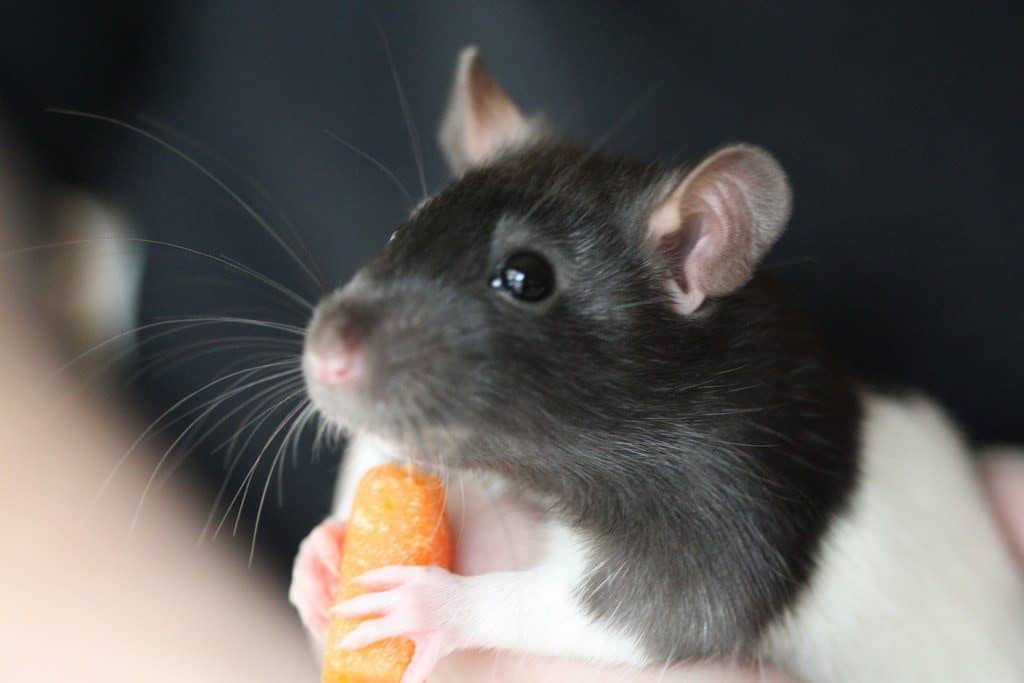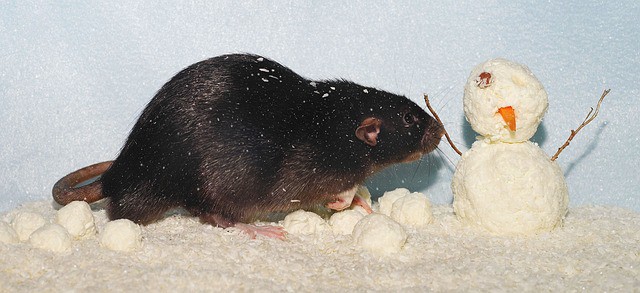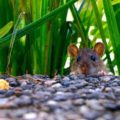Table of Contents
It is no secret that humans don’t love rats but rats love humans, or at least they like living where we live. There are a variety of reasons those large rodents enjoy sharing space with you. Food and shelter are what it narrows down to, but there are steps you can take to keep your home rat-free.
What Causes Rats to Come in Your House
Rats are resourceful and can live in both natural and human-made environments. There are specific aspects you should be aware of that will attract rats. Then, you can take steps to make sure your home does not become a rat’s home.

Photo by John Morgan Licensed Under CC BY 2.0
Food
Rats have a reason to be where they live, and the food supply is often the number one reason. Rodents are not picky eaters and will munch on anything left out, including garbage.
Keep clean the area where you prepare food. Make sure to wipe down counters, sweep floors, and remove any crumbs that are inviting to rats. Staying on top of dishes is essential. Don’t leave dishes for more than a day before cleaning.
Storing your food is also crucial. Sealed containers are the best option to avoid inviting rats into your kitchen. Put leftovers away immediately, and food should never be left out overnight.
Pet food is also appealing to rats. Birdseed, cat food, and dog food make for tasty treats and bring rodents back for more. Pet food should be stored in airtight containers and preferably not at ground level.
You should also pay attention to how you throw out your food. Garbage cans should have tight lids and keep the area they are stored clean and free of extra food bits. Washing down the bins on a regular basis also helps.
Easy Access
Rats look for easy access into homes. They are skilled climbers and can squeeze through holes that are only a quarter of an inch. Areas that may have these gaps can include:
• Areas around pipes
• Areas where wires enter the house
• Gaps beneath doors (especially garages)
• Crawl space openings
• Roof vents
• Attics and basements
Using screens in these areas will deter rats from entering, but make sure the holes are small, the traditional chicken wire can be too big and still allow the rodents access.
Environment
Certain environments are more inviting to rodents, such as cluttered rooms. If you are a pack rat, it’s not uncommon to have a family of rats living with you. Make sure you can see your floor – especially around big furniture. Keep closets ordered and tidy. Organization means less space for nests.
Don’t forget attics and basements. These areas are homey for rats because they are often cluttered and not checked regularly.
Remove droppings and other indications of previous rat infestations. Rats are social creatures and are attracted to areas that have familiar smells, such as other rats. If you had rats in the past, have a professional clean the home to avoid another encounter.
How to Deter Rats from Your Yard
Your yard is part of your home, and unfortunately, there are plenty of attractive aspects to a rat.
Gardens are an oasis for rats. They have a natural feel to them and provide food and water. Rodents love ripe fruits and vegetables. Fruit left on the ground is a green light for rats. If you have a garden or fruit trees, you must stay on top of collecting your produce. If you have a compost pile, avoid adding animals products and food waste as much as possible, or keep it in a container with a secure lid.
Bird feeders can also attract rats. Messy birds and squirrels leave seed scattered beneath the feeder. Keep feeders over areas that are easy to sweep up or have catchers in place for any loose birdseed. Rats will quickly feel at home if they have birdseed to snack.
Woodpiles that remain untouched for long periods of time make great homes for rodents. Stacks of wood should be tended regularly and stored off the ground and away from buildings.
Rats like to stay warm in the winter and will try to move in when the cold hits. If you live in a place that has storms often, also keep a look out for rats attempting to move into your home.
Feeding stray cats and dogs inadvertently feeds rats as well. Food and water displayed and continuously refilled? It’s a rat’s dream. Don’t leave pet food out unattended or overnight. Dog poop can also attract rats – based on what your dog eats – so stay vigilant in picking up dog poop.
Unkempt yards provide comfortable homes for rats. To avoid sharing space with them, trim vegetation regularly and maintain a tidy lawn. Pick up any unused equipment and keep it stored up high or away from walls. With fewer places to hide, rats will think again before settling down.
Rats prefer to move unseen and take advantage of tall grass and other plants. As long as you stay on top of your yard work, they won’t have anywhere to nest or travel. Keep trees and bushes at least six feet away from roofs to limit rats’ access to your house.
As you trim your florae, consider adding others. The smell of peppermint is thought to deter rodents, so planting mint plants in the yard could be beneficial.
The best defense is a good offense. Add plastic snakes or owls to your yard’s decoration. Rats fear their natural predators and will look for another place to call home.
Conclusion
Prevention is the best way to avoid a rat problem. Now you know what attracts rats to your home and how you can prevent these roommates.
Rats are always on the move, looking for the best place to live. If you remove access to food and shelter, they will most likely move on to the next best place. Cleanliness is next to godliness when it comes to rats. Maintain a clean and well-kept home and yard, and you won’t have to worry about those large rodents.





